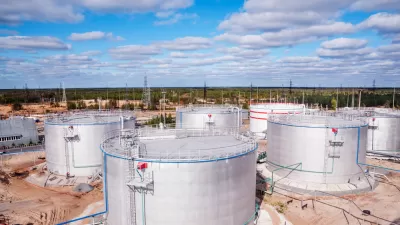Energy consultant Michael Lynch argues that there are upwards of 10 trillion barrels of oil out there, as opposed to the 2 trillion that peak oil proponents recognize.
Says Lynch, "A century ago, only 10 percent of it was considered recoverable, but improvements in technology should allow us to recover some 35 percent - another 2.5 trillion barrels - in an economically viable way. And this doesn't even include such potential sources as tar sands, which in time we may be able to efficiently tap."
Lynch also claims that new sources in Latin America, Africa and the Dakotas will ensure that prices are kept low and the U.S. is not beholden to the Middle East for supply.
"Like many Malthusian beliefs, peak oil theory has been promoted by a motivated group of scientists and laymen who base their conclusions on poor analyses of data and misinterpretations of technical material."
Thanks to W.Davis
FULL STORY: ‘Peak Oil’ Is a Waste of Energy

Planetizen Federal Action Tracker
A weekly monitor of how Trump’s orders and actions are impacting planners and planning in America.

Maui's Vacation Rental Debate Turns Ugly
Verbal attacks, misinformation campaigns and fistfights plague a high-stakes debate to convert thousands of vacation rentals into long-term housing.

Restaurant Patios Were a Pandemic Win — Why Were They so Hard to Keep?
Social distancing requirements and changes in travel patterns prompted cities to pilot new uses for street and sidewalk space. Then it got complicated.

In California Battle of Housing vs. Environment, Housing Just Won
A new state law significantly limits the power of CEQA, an environmental review law that served as a powerful tool for blocking new development.

Boulder Eliminates Parking Minimums Citywide
Officials estimate the cost of building a single underground parking space at up to $100,000.

Orange County, Florida Adopts Largest US “Sprawl Repair” Code
The ‘Orange Code’ seeks to rectify decades of sprawl-inducing, car-oriented development.
Urban Design for Planners 1: Software Tools
This six-course series explores essential urban design concepts using open source software and equips planners with the tools they need to participate fully in the urban design process.
Planning for Universal Design
Learn the tools for implementing Universal Design in planning regulations.
Heyer Gruel & Associates PA
JM Goldson LLC
Custer County Colorado
City of Camden Redevelopment Agency
City of Astoria
Transportation Research & Education Center (TREC) at Portland State University
Jefferson Parish Government
Camden Redevelopment Agency
City of Claremont



























